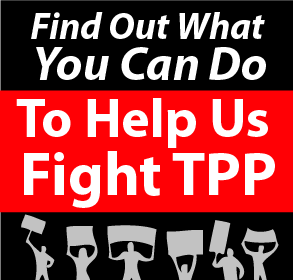Ben & Jerry Join Local and National Groups Calling for a Fair Deal on Trans-Pacific Trade
Ice Cream Makers Help Coalition Deliver Over 10,000 Postcards to Trade Negotiators Currently Meeting in Chicago
CHICAGO, IL – September 6 – As a major Pacific Rim trade summit begins in downtown Chicago aimed at concluding a massive new international trade pact, iconic ice cream makers Ben Cohen and Jerry Greenfield joined fair trade advocates from the labor, environmental, family farm, public health and consumer movements today to deliver over 10,000 hand-signed postcards urging the U.S. Trade Representative to ensure any deal advances labor, environmental and human rights standards at home and abroad.
“The trade negotiations beginning today could have a significant impact on the economy, the environment, public health and consumer safety in Chicago and beyond,” said Arthur Stamoulis, executive director of Citizens Trade Campaign. “Civil society organizations from around the country and the world, including civic-minded businesses like Ben & Jerry’s, are in town urging negotiators to put human needs rather than corporate profits at the center of any new pact.”
“We started a company which is learning to make fair and just decisions that take people into account. We need international trade agreements that do the same and help to improve living standards at home and abroad,” said Ben Cohen, co-founder of Ben & Jerry’s. “People in Chicago, the United States and throughout the world deserve a fair deal.”
Trade negotiators from nine Pacific Rim countries are meeting at the Hilton Chicago from September 6 – 15 to try to complete a new Trans-Pacific Free Trade Agreement. The pact is poised to become the largest regional trade agreement of its type ever for the United States, and is likely to have significant impacts on the economy, environment and national sovereignty.
The postcard delivery comes a day after a rally in Grant Park where protesters demanded a “fair deal or no deal.” At issue is whether this first trade pact negotiated by the Obama administration will implement the President’s campaign commitments to replace the North American Free Trade Agreement (NAFTA) model of trade pacts that has cost the U.S. manufacturing jobs and flooded the country with unsafe imports. The postcards delivered call on negotiators to insist that the Trans-Pacific trade deal include:
- Strong, clear and enforceable labor standards base on International Labor Organization conventions
- An end to investor-to-state provisions that threaten environmental and consumer protections
- A clear mandate enabling countries to obtain affordable, generic medications for sick people
- Respect for communities’ decisions as to how to best support family farmers and feed their populations
Ben & Jerry’s helped collect thousands of postcard signatures at concerts and other events throughout the month of August. Other postcards were collected by fair trade advocates at a Labor Day rally in Chicago’s Grant Park on Monday, and at other events throughout the country.
“Just like there’s more than one way to do business, there’s more than one way to do trade policy. We encourage trade negotiators to create an agreement that works for working people, farmers and the environment in all countries,” said Jerry Greenfield, co-founder of Ben & Jerry’s.
“These talks are a big deal because they will decide if this is another damaging NAFTA with the same ban on Buy America, incentives to offshore jobs and limits on import safety that large corporations want but significant majorities of American across the political spectrum oppose or a new fair trade deal,” said Lori Wallach, director of Public Citizen’s Global Trade Watch. “The U.S. already has trade deals with countries representing 80% of this group’s total GNP, so unless this first Obama trade deal actually fixes the old ones as Obama promised as a candidate, we are talking about the damage of NAFTA with Vietnam and Malaysia and no upside.”
“This is about life and death. Trade agreements need to affirm nations’ rights to provide life-saving, generic medications to people living with AIDS and other diseases,” said Akudo Ejelonu, national field organizer for HealthGAP. “Instead, the U.S. acting as the mouthpiece for multinational pharmaceutical companies, demanding countries like Vietnam, Malaysia, Chile and Peru agree to policies that would cut off access to affordable medicines for millions.”
“Chicago and the nation cannot afford another trade agreement that offshores manufacturing and service sector jobs, reduces the tax base and puts a downward pressure on the wages and benefits in the jobs that are left,” said Alex Han of Stand Up! Chicago. “We hope negotiators are ready to learn from the damage wrought by past trade deals. Otherwise, they may as well go home now.”
“Trade negotiators need to recognize that family farmers and big corporate agribusiness have very different interests. A fair trade agreement would serve farmers by respecting communities’ right to food sovereignty, fair prices and protecting against unsafe imports. Corporate traders export, not family farmers,” said Ben Burkett, Mississippi farmer and president of the National Family Farm Coalition.
“This agreement, and its investment chapter in particular, must not be based on the NAFTA model,” said Bill Waren of Friends of the Earth. “Big oil, mining multinationals and giant agri-business are demanding NAFTA-style investment provisions. They don’t want to be held accountable by legislatures or courts for the environmental destruction and social injustice wrought by their investment projects around the Pacific Rim. No NAFTA for the Pacific.”
The Citizens Trade Campaign (CTC) is a national coalition of environmental, labor, consumer, family farm, religious, and other civil society groups founded in 1992 to improve the North American Free Trade Agreement (NAFTA). We are united in a common belief that international trade and investment are not ends unto themselves, but instead must be viewed as a means for achieving other societal goals such as economic justice, human rights, healthy communities, and a sound environment.

